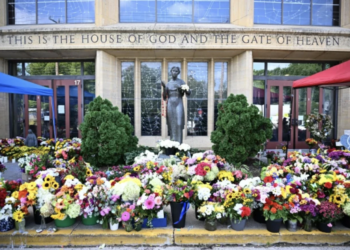Tom Jones is Councillor for Scotton and Lower Wensleydale and author of the Potemkin Village Idiot substack.
The assisted suicide Bill, which has its Second Reading in the House of Lords today, is so insufficient and poorly drafted that even proponents of assisted suicide are abandoning it, like a picnic party before a storm.
The Bill, whose sponsor, Kim Leadbeater, claimed would have the “strictest protections and safeguards of any legislation anywhere in the world” after its First Reading last October, has been criticised heavily for lacking adequate safeguards. Now, Lord Forsyth of Drumlean, a pro-assisted suicide peer, has derided the Bill for its potential to give “wide-ranging powers on a highly sensitive issue” to ministers.
Forsyth, who tabled an amendment to the Government’s Health and Care Bill in 2022, asking that the Government draft and give time to consider assisted suicide legislation, has made his concern about the Leadbeater assisted suicide Bill plain. In a letter to The Times this week, Lord Forsyth, along with fellow Conservative peer Lord Bridges of Headley, wrote that “whatever one thinks about the principle of assisted dying, this Bill is not fit for purpose as it stands.”
Lord Forsyth’s recent criticism of the Bill came after a damning report from the House of Lords Delegated Powers and Regulatory Reform Committee highlighted that the Bill is full of “skeleton legislation”, with provisions that are “so insubstantial that the real operation of the Act is, or sections of an Act, would be entirely by the regulations or orders made under it”.
These delegated responsibilities, the report stated, would give “sweeping, unspecified and unjustified powers to the Government”. The Bill, according to the report, could bestow upon Government ministers the ability to create new criminal offences, criminal penalties, and civil sanctions, along with the power to legislate further and to amend future primary legislation. In short, ministers would be given sweeping powers, and Parliament would be denied the opportunity to apply the appropriate and necessary scrutiny demanded of a policy of such magnitude.
If the Leadbeater Bill were to become law, many important decisions, such as which fatal substances could be used to carry out assisted suicide, would then be made by way of secondary legislation, created by the relevant Government minister and their department. The Committee report highlights that many such regulations would be enacted through the negative procedure, by which regulations would automatically become law on the day they are signed off by the Minister, with no requirement for them to be scrutinised in any significant way by Parliament.
The best legislation stands the test of time. It can be amended, but the foundation is sure, and the principle and policy intent are clear. This bill is open to ministerial whim and shifting political sands in a way which can only lead to uncertain, fickle legislation, creating ambiguity rather than clarity. It is a dangerous way to legislate on any matter, least of all one which carries lethal force. Leadbeater’s promise on protections and safeguards may prove a claim that will live in infamy
Lord Forsyth is by no means the first pro-assisted suicide parliamentarian to express reservations about the Bill in recent weeks. He follows Vicky Foxcroft, who does not believe that “all safeguards are in place”, Josh Fenton-Glynn, who stated that he “support[s] assisted dying, but safeguards in the bill aren’t strong enough”, and Jen Craft, who highlighted that the Bill “do[es] not have the adequate safeguards in place”.
Richard Burgon MP stated that while he initially supported the principle of assisted suicide, he could not support legislation to which “the vast majority of primary care doctors, geriatricians and groups representing people with disabilities, eating disorders and domestic violence” were opposed.
Support for the Bill appears to be crumbling away. Between the Bill’s Second and Third Readings in the House of Commons, the majority by which the legislation passed was more than halved, from a majority of 55 down to only 23, indicating that a substantial number of MPs had changed their minds.
As the Bill makes its way through the Lords, the report from the Delegated Powers and Regulatory Reform Committee, and the refusal of eminent peers such as Lord Forsyth to back the legislation, should give any Member of the House of Lords who is as yet undecided on the issue the courage to do what is right and reject the Bill.
As the Hansard Society guide to the House of Lords legislative process highlights, “the House of Lords has the authority to reject, delay, or otherwise block the assisted dying bill.”
Not only does this legislation lack adequate safeguards for our society’s most vulnerable, but it also could allow for an unjustifiable delegation of power to Government ministers, setting a troubling precedent. The House of Lords must take account of this and the manifold deficiencies of this Bill and the process, and should have no qualms about ensuring the Bill stops here and makes no further progress.
Here, but no farther.





![Gavin Newsom Threatens to 'Punch These Sons of B*thces in the Mouth' [WATCH]](https://www.right2024.com/wp-content/uploads/2025/08/Gavin-Newsom-Threatens-to-Punch-These-Sons-of-Bthces-in-350x250.jpg)
![ICE Arrests Illegal Alien Influencer During Her Livestream in Los Angeles: ‘You Bet We Did’ [WATCH]](https://www.right2024.com/wp-content/uploads/2025/08/ICE-Arrests-Illegal-Alien-Influencer-During-Her-Livestream-in-Los-350x250.jpg)








